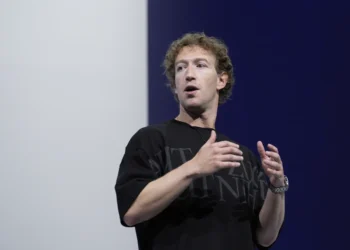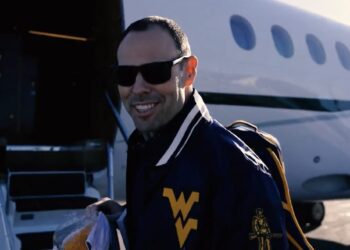CHARLESTON, WV (LOOTPRESS) – Charleston-based ensemble Minor Swing have been steadily building upon an expanding following as they bring their idiosyncratic brand of Gypsy jazz music to venues all throughout the Mountain State.
Even those outside the realm of jazz have found themselves responding to the growing buzz established by the local outfit, who recently gave a triumphant performance at Charleston’s Live on the Levee concert series with the Grammy Award winning Ranky Tanky – more on that here.
The distinct approach of jazz guitar titan Django Reinhardt serves as a central component of the Minor Swing sound – the group even drew inspiration from a composition of Reinhardt’s for their name.
“I was going through a very big Django Reinhardt phase,” says Ray Singleton, lead guitarist for Minor Swing, of the group’s origins. “And I said ‘I really wish I had someone to play this music with.’”
This led to his coming into contact with violinist Alasha-Al-Qudwah, thus forming the core of the group. “We reached out and it started with the two of us, and we added a friend of ours on guitar for a while just so that would free me up to improvise, then we added the bass,” continues Singleton.
Though the original bassist and second guitarist didn’t stick, the group continued to develop, recording a full-length album in the form of 2021’s Primavera and establishing a perhaps unexpected following throughout the Mountain State.
“Surprisingly, they love it,” says Al-Qudwah of the group’s reception from West Virginia audiences who may not be well-versed in the intricacies of Gypsy jazz, or jazz as a general concept, for that matter.
“I feel like we are so engaged. But honestly, we’re engaged from a lot of people that aren’t necessarily in the jazz scene,” she continues. “I feel [that] we’re completely accepted.”
“It’s been pretty well received right from the beginning,” declares Singleton. “I think because people had never heard it before, we often get asked ‘What is this?’ What are you playing? What is this stuff?’ So I’ll usually say something on the mic, like I did at the levee, about what this kind of music is, where it comes from,”
But it hasn’t been all sophisticated harmonies and contrapuntal nuance for the two, who came into the group having already gained recognition locally in more standardized musical formats.
“I used to be in a rock band, and Ray has been in bands all over town,” says Al-Qudwah. “So I think [audiences] see this music happening and they realize that it’s so intricate, and it’s very studious on a certain level as well.”
“It’s kind of like jazz bluegrass,” explains Singleton of the Gypsy jazz sound. “There’s an emphasis on the skill of the players – so many bluegrass players are just awesome players – and it’s very energetic and fast like a lot of bluegrass is.”
“You see a ton of bluegrass [and] string music with this setup,” Al-Qudwah continues, referring to the group’s signature acoustic guitar/violin attack. “So I love it when [audiences] actually hear the sound and they’re experiencing something new with that setup.
The conversation then moves to the influence of folk music on the group’s sound, and I share a delightful back and forth with Alasha regarding our mutual appreciation for Bob Dylan’s 1976 album, Desire. The album prominently features violinist Scarlet Rivera, whose input had a profound impact on the sound of the record.
“I’m obsessed with that album actually,” she exclaims. “One more cup of coffee, I’ve probably covered that with so many different groups.”
As far as the influence of folk music, it certainly is there, but perhaps not in a capacity one might expect.
“I would say everything that we do has a folk influence, it’s just not from this country,” propounds Al-Qudwah. “We have a Brazilian folk tune, but a lot of those scales are indigenous to the French Romanians and their folk music. But I feel like that’s our personality coming out in it as well. Especially for me, to be completely honest. If I was [asked] ‘Are you playing like [French-Italian jazz violinist Stéphane] Grappelli?’, I’m not. I’m playing like Alasha.”
“The acoustic sound just fits with this music,” says Singleton, compounding upon the influence of folk and other guitar-oriented styles on the group’s sound. “I love Joe Pass, and I was just listening to Chet Adkins there a second ago. I’m influenced by all the major guitar players.”
But stylistic aesthetic and genre labels notwithstanding, the most significant aspect of the group’s approach may very well be the deliberate emphasis on melody.
“Almost every song we play – not all, but almost every one – we state the melody first, and generally last as well,” explains Singleton. “The improv comes in between, and we like to use some songs that are familiar like [Duke] Ellington’s “It Don’t Mean a Thing” or we’ll play some jazz standards like “Ain’t Misbehavin.”
Perhaps equally significant as the musical sophistication of the group’s tunes is their awareness and willingness to engage with the audience.
“We’ll even do Beatles tunes,” Singleton says. “We don’t want to play an hour of original music, even though it’s well received, because we want to tickle people’s ears and catch their attention.”
Alasha is succinct in her response to whether there are plans for new music from the group.
“Definitely,” comes the answer.
“We don’t have specific dates or anything like that,” Singleton adds. “But we’re still working on tunes, we’re still adding new tunes to the set. I’m kind of thinking we might do something live. But we’re not sure.”
Primavera is available now for streaming, and more information, along with performance dates and updates, can be found here at the Minor Swing Facebook page.











